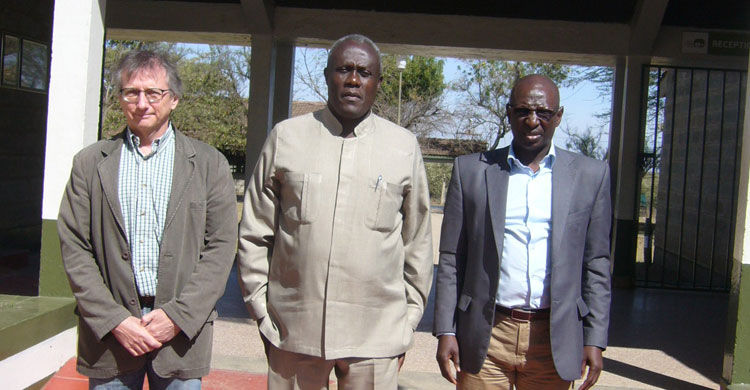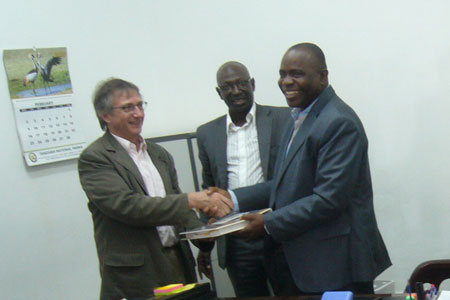Mission of the Technical Support Unit (TSU) in East Africa

François Lamarque, Professor George E. Otianga-Owiti and Abdoulaye Ndiaye at the KWSTI © TSU
Guest article from the Technical Support Unit (TSU)
Bonn, 4 March 2015 - The Technical Support Unit (TSU), represented by Abdoulaye Ndiaye, Directorate of National Parks, Senegal (DPNS) and François Lamarque, Ministry of Ecology, Sustainable Development and Energy (MEDDE/DEB), carried out a mission to Kenya and Tanzania from 1 to 7 February 2015.
The objectives of this mission were to (i) assess the feasibility of organizing a one-week workshop on wetland management plans for the Eastern and Southern African sub-regions; (ii) explore the feasibility of organizing a one-week training course on AEWA implementation and monitoring of waterbirds to take place at the College of African Wildlife Management (Mweka College) in Tanzania; (iii) attempt to link up Mweka College and Garoua Wildlife College, both specialized in wildlife management in Anglophone and Francophone Africa respectively.

To achieve these objectives, the TSU delegation first visited the Kenya Wildlife Service Training Institute (KWSTI) in Naivasha (Kenya) where they met the principal of KWSTI, Professor George E. Otianga-Owiti, teachers of the module on wetlands as well as the administrative manager and visited the facilities of the Institute. As a result of the visit to KWSTI, it now appears possible to organise a one-week workshop on wetland management at KWSTI during the second half of May 2015, for some thirty participants, including the AEWA National Focal Point and a site manager/field technician from each AEWA Contracting Party from Eastern and Southern Africa. The workshop programme will be developed in cooperation with KWSTI given that the latter already providestraining in this area. It will focus on the presentation of case studies (success / failure analysis, methodologies, etc.).
The delegation subsequently visited Mweka College in Tanzania, the main regional training institute dedicated to wildlife management in East Africa. The TSU representatives met with Mweka officials and teachers, and the discussions with students at the end of the visit were a highlight of the mission.
The exchange with the Mweka rector and teaching staff revealed that the college’s curriculum iscurrently being reviewed; the new curriculum will be introduced in the next academic year starting in August, and it is still possible to integrate new courses on AEWA, migratory waterbirds and wetlands. These courses would offer an opportunity to showcase tools such as the Wings over Wetland (WOW) Flyway Training Kit (FTK) and the ONCFS Training Module on Waterbird identification and surveying in Africa.
Assessing the current situation, it appears too early to train Mweka students before the teachers are familiar with the subject. A Training of Trainers (ToT) course will therefore be held in July for Mweka teaching staff and the relevant departments (wildlife and forest) of the Ministry of Natural Resources and Tourism.
The coming months may see several occasions that could enable the creation of a network between the three regional training centres visited by the TSU (Garoua Wildlife College, KWSTI in Naivasha and Mweka College): in May, a meeting of the heads of the three institutes may take place at KWSTI, in the margins ofthe workshop on management plans; in July, teachers from the three training institutes could receive training in the framework of the ToT course; and in November, a side event on training in Africa could possibly be organized during the AEWA MOP6, with the participation of the heads of the three institutes.
Last updated on 05 March 2015


